Huge Roman Coin and Gem Cache Discovered in an Ancient “Magical City”
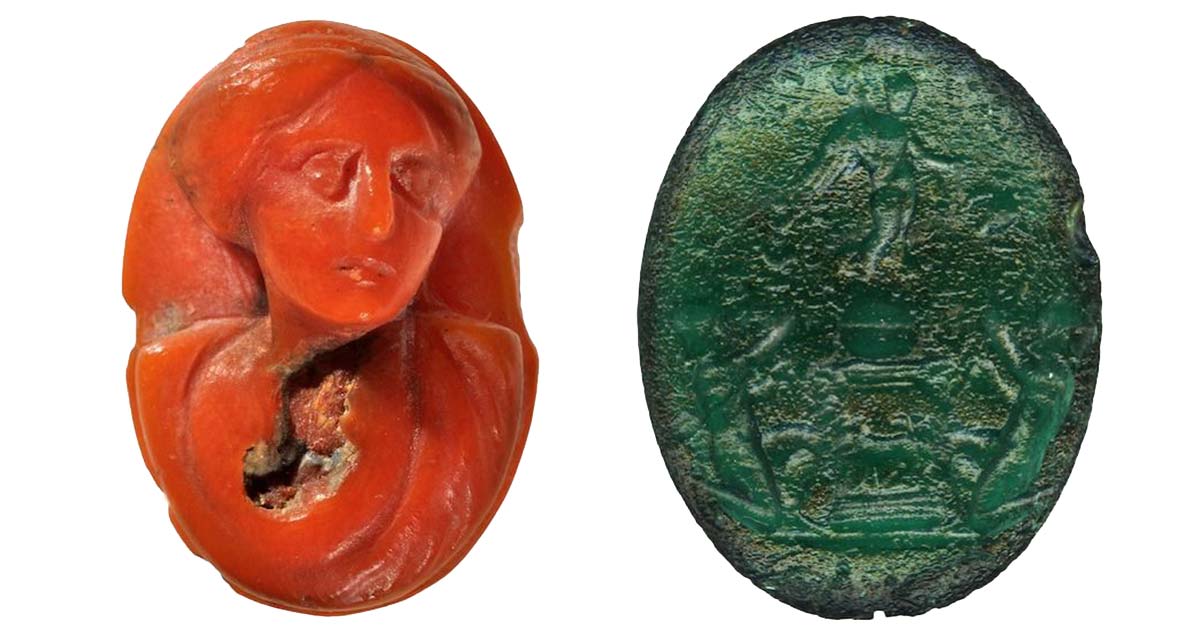
Excavations at a spectacular ancient Roman site in northern Italy have produced some significant finds during the most recent archaeological season. The latest of these remarkable discoveries in the ancient city of Claterna is an incredibly valuable collection of approximately 3,000 silver, gold and bronze Roman coins and 50 gems, many of which were engraved with images meant to honor various Roman deities. These coins and gems were not all found together but were discovered at different spots in what would have been a sophisticated urban settlement affiliated with the Roman Empire.
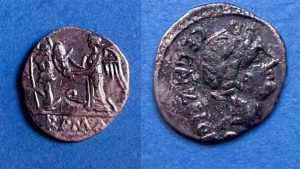
Thousands of Roman coins have been excavated so far at Claterna. (Soprintendenza Bologna)
Excavating the Wealth of a Successful Roman Settlement
Located in the hills of northern Italy near what is now the city of Bologna, the old Roman city of Claterna was once a prosperous regional center. Archaeologists have staked out a 44-acre (18 hectare) site for excavation work, which is expected to continue for the next few years. The amazing collection of Roman coins and gemstones was recovered during recent digs on the 10 percent of this area that has been explored so far, officials explained in statement issued by the Italian Ministry of Culture.
Earlier excavations at the site uncovered many ruins that reveal the truth about Claterna’s importance. These discoveries include the remains of multiple roads, a dwelling that featured multicolored mosaic floors and exotic Roman baths, and a huge theater or forum where public entertainment would have been presented.
Archaeologists who’ve spend time digging through the ruins of Claterna have referred to it as a “magical place,” with some even going so far as to compare it to one of ancient Rome’s most famous and most frequently visited metropolises.
“We are facing the largest non-stratified archaeological area in Northern Italy,” said Lucia Borgonzoni, the Italian Undersecretary of State assigned to the Culture Ministry. “Given the importance and quantity of finds brought to light so far, we can probably speak of a ‘Pompeii of the North.’”
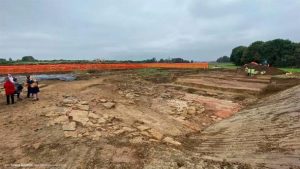
Recent digs have uncovered thousands of Roman coins and colored gems at the archaeological site of Claterna in northern Italy. (Soprintendenza Bologna)
Unearthing Roman Coins and Colored Gems at Claterna
As they sorted through the currency, the archaeologists identified one Roman coin that was particularly rare and valuable. This type of silver coin is known as a quinarius, and this particular sample was minted in 97 BC during the time of the Roman Republic. This coin was found lying on the ground among the rubble of a collapsed corridor in the ancient theater. The archaeologists believe it was lost there around the time when the structure was built.
The presence of so many coins in the settlement indicates that Claterna was likely a center of commerce and not just a pilgrimage or tourist site, the archaeologists have concluded. “It was a trading center with direct contacts with Rome,” Borgonzoni declared.
As for the colored gems, they were clearly commemorative items. They featured engraved images of Roman deities as well as of significant city structures, including Claterna’s huge theater. The Culture Ministry actually hopes to restore this venue for future use, which would allow visitors to enjoy entertainment spectacles just as the ancient Romans did in Claterna more than 2,000 years ago.
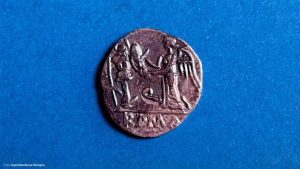
About 3,000 Roman coins have been discovered at Claterna during the excavations. (Soprintendenza Bologna)
Remembering the “Pompeii of the North”
The Roman settlement at Claterna was founded sometime in the second century BC. Its first mention in the history books linked it to the early military exploits of a young general named Octavian, who would go on to be crowned as the first Roman Emperor Augustus in 27 BC. Octavian and his men fought in the region during the civil war that broke out between the Roman Senate and forces led by the defiant and rebellious general Mark Antony, following the assassination of Julius Caesar that threw the Roman Republic into chaos.
It was in the first century AD, during the heyday of the Roman Empire, that the city of Claterna flourished as an administrative, economic and political center. As revealed during the excavations that have been carried out so far, the city featured an impressive array of monumental buildings, including a temple, a civil basilica, multiple structures with porticoes, the aforementioned theater and an amphitheater that likely hosted gladiatorial games.
Claterna’s large rectangular city center had space reserved for a marketplace and was decorated with various monuments and other public installations. At various locations, the archaeologists have uncovered the remains of houses, some of which were quite spacious and would have been occupied by Roman elites.
There were many modest single-family homes built in Claterna as well, reserved for lower- and middle-class residents. On the outskirts of the city the researchers found the ruins of workshops run by craftsmen who manufactured consumer goods from metal, clay and glass. There was also a large necropolis on the edge of Claterna, as was typical of Roman settlements.
Claterna was occupied from the second century BC into the sixth century AD, after which it was completely abandoned. It experienced a period of economic decline late in the fourth century and into the fifth, hanging on as a lightly populated village for another hundred years or so before it finally disappeared into the annals of history.
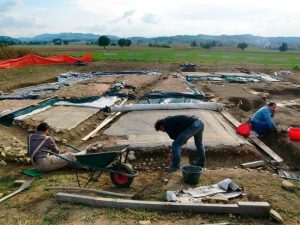
Archeological excavations of the Roman domus with mosaics in Claterna, Italy. (Desyman / CC BY-SA 3.0)
The Astonishing Resurrection of a Lost Place and Time
Italy’s Cultural Ministry and the superintendency for the city of Bologna will work closely with local institutions to inform the public about the incredible discoveries at the Claterna archaeological site.
“We intend to implement a series of activities that will involve local entities and institutions, designed to bring knowledge of this magical place rich in history to young people first and foremost and to attract many visitors arriving from all over the world,” Borgonzoni said in the Culture Ministry statement.
The newly discovered Roman coins and gems will likely play a prominent role in the upcoming publicity campaign. These precious finds provide a fascinating glimpse of the immense wealth that would have changed hands over the centuries in the thriving Roman city of Claterna.